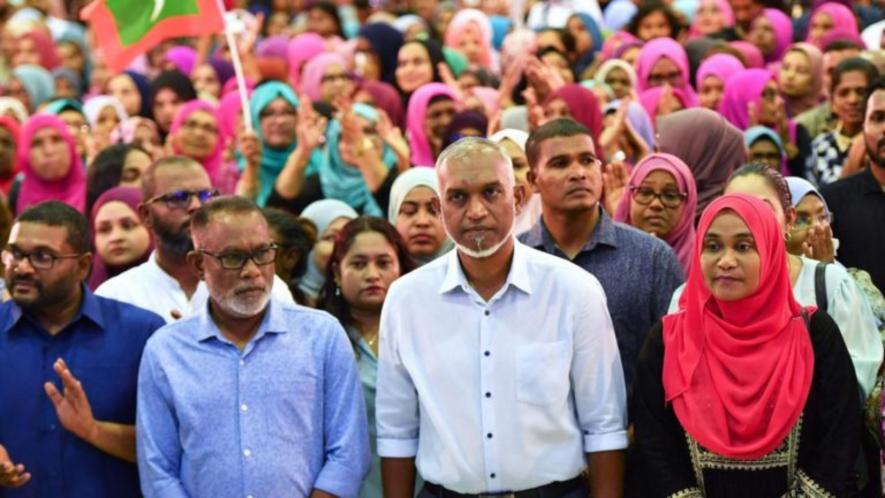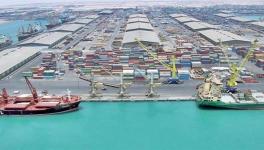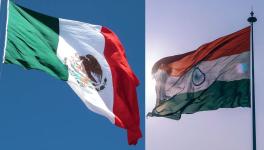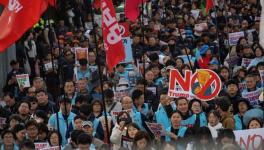Maldives Explores Life Outside Indo-Pacific

Maldives’ President-elect Dr. Mohamed Muizzu (C) addressing supporters, Malé, October 2, 2023
A massive Western media barrage was to be expected caricaturing the election result of the runoff in the Maldives presidential poll in binary terms as China’s “gain” being India’s “loss”.
It further laments that democracy is in peril in the Maldives under the incoming presidency of Mohamed Muizzu, the incumbent Mayor of the capital city of Malé, a brilliant technocrat by training who holds a doctorate in engineering from a British university and entered politics over 10 years ago to serve as cabinet minister in successive governments and gained prominence for his pivotal involvement in overseeing significant infrastructure projects, most notably the iconic Sinamale Bridge, which served as a vital connection linking the capital city to the Velana International Airport on Hulhulé and extending further to the planned new city of Hulhumalé — and in the process got branded as “pro-China” by the western countries and the Indian media.
Both assumptions about Muizzu are deeply flawed, anchored on the US’ so-called Indo-Pacific strategy and its geopolitical ramifications. They ascribe to Maldives a slot in the Indo-Pacific strategy, which it is expected to habitate without questioning, and deny that small country’s freedom of choice in a world in transition.
Maldives just displayed a thrilling finish to its presidential election, which was so hotly contested that a run-off became necessary and an opposition, which was the underdog, defeated the incumbent president by a convincing margin of 8 percent of votes polled.
Indeed, the sheer vibrancy of the democratic process that goes on inside the People’s Majlis puts to deep shame all countries in the South Asian region, including Pakistan and the self-proclaimed “mother of democracy” next door, India.
Constitutional rule in the Maldives dates back to 1932 when a constitution was drawn up opening vistas of democratic rule that the reigning Sultan felt threatened and mobs were instigated to publicly tear up the document. Since then, the Constitution has been revised several times. Incidentally, the Maldives is considering a switchover to the parliamentary system which it considers to be a more representative form of government and a bulwark against the danger of concentration of power in the hands of an authoritarian individual.
The fact of the matter is that Maldives has a highly literate population which is politically empowered. Only Sri Lanka comes close to it in this respect in the region. The paradox is, these two countries also have something else in common — coping with a massive neighbour like India which taught them the art of navigating a robustly independent foreign policy to balance Indian hegemony.
There have been times when Malé and Colombo wore a deceptive look of submissiveness but in reality, on vital interests they held fast and firm playing for time. In the current situation, quite obviously, they regard China as a balancer. Indians, with their zero-sum mindset, do not understand that these small countries are neither “pro-India” nor “pro-China” but want to be friendly toward both and would strive to take advantage of it to safeguard own interests, primarily in the economic sphere.
This is particularly so lately, as South Asia is turning into an arena of big power rivalry (which was never the case during the Cold War) and a new player has appeared in the region to impose its will — the United States.
It is not only Maldives and Sri Lanka but all countries in the region, big and small, including most recently Pakistan too, which are today under Western pressure to take sides. If the US feels emboldened to try to impose its hegemony over the South Asian region, it is primarily because of the tacit support that India, the perennial “swing state”, extends to it.
The shift in Indian positions in the context of the growing transformation of US-Indian relations dates back to sometime circa 2006 with the dissolution of US-Indian antagonism following their nuclear deal. One of the structural factors that came into play in the making of this paradigm shift — Washington and New Delhi cooperating and coordinating their approach to South Asia — was the Indian and American desire to forge a new partnership grounded in promoting geopolitical equilibrium in Asia in the face of China’s rise. The result is that India effectively became a party to the American efforts to manipulate the South Asian regimes with a view to aligning them with its Indo-Pacific strategy.
Suffice to say, the current lamentation that “China-backed candidate Mohamed Muizzu defeated pro-India President Ibrahim Solih, et al, is complete nonsense. Make no mistake, “pro-India” Solih never really turned his back on China. Nor was it the case that his decision not to terminate the Chinese projects in Maldives that were negotiated by his “pro-China” predecessor never stopped him from seeking a full-throttle “India first” relationship with Delhi.
Politicians resort to rhetoric in order to attract votes, which is seldom followed through. This is not a South Asian phenomenon, either — the US is currently negotiating a security treaty with Saudi Arabia, a country that Candidate Joe Biden once not too long ago had called “Pariah.”
India is deeply enmeshed in the finances of the Maldives, trade, infrastructure growth, etc. which are so fundamentally important for the growth of the Maldives that it will be very, very hard to stop all that — i.e., even if president-elect Muizzu wants to.
Second, make no mistake, geopolitics is not a burning concern for the people of Maldives, although there is a strong undercurrent of anti-India sentiments (as in all South Asian countries) that politicians exploit during closely-fought elections.
Arguably, India could as well have avoided the showdown with Solih’s “pro-China” predecessor Abdullah Yameen if only powerful interest groups among the elites and within the establishment hadn’t jumped into the fray over the decision in 2012 by the Yameen Government to cancel the GMR group’s $511 million contract for modernising the Male Ibrahim Nasir International Airport. Alas, that still remains an untold story — and, probably, just as well.
Hopefully, history will not repeat, as president-elect Muizzu has already made his intention known publicly that he will stick to his campaign promise to remove Indian military personnel stationed in Maldives. “The people have told us that they don’t want foreign military here,” he said. Delhi must calmly, rationally assess what Muizzu’s commitment entails.
An AP despatch claims “It’s a serious blow to India in its geopolitical rivalry with China in the Indian Ocean region.” Is it really so? Apparently, 75 Indian personnel and two helicopters would tilt the geopolitical balance in the Indian Ocean in India’s favour!
Most importantly, Muizzu also went on to say that Maldives is against any form of foreign military presence on its soil — by any country. Wasn’t it an insensitive move bordering on idiocy to station our military personnel in Maldives? Delhi should have anticipated a train crash at some point,
This is the sort of strategic overreach that the US usually makes in its hubris — e.g., ‘shoving shit down the throat’ of Boris Yeltsin’s Russia, as Bill Clinton once admitted in private to his aide Strobe Talbott during a visit to Moscow in January 1996 (aimed at ensuring Yeltsin won a second term), while also foretelling with great prescience that there was bound to be a backlash at some point.
Clinton was spot on; it came within six months when Vladimir Putin moved to Moscow from St. Petersburg to join the administration of President Yeltsin. The rest is history.
MK Bhadrakumar is a former diplomat. He was India’s ambassador to Uzbekistan and Turkey. The views are personal.
Get the latest reports & analysis with people's perspective on Protests, movements & deep analytical videos, discussions of the current affairs in your Telegram app. Subscribe to NewsClick's Telegram channel & get Real-Time updates on stories, as they get published on our website.
























